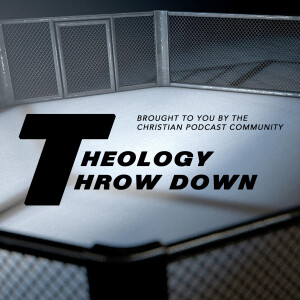

Theology Throw Down
https://feeds.captivate.fm/theology-throw-down/Episode List

Navigating Worship Principles: Regulative vs. Normative
The discourse presented in this episode of Theology Throwdown meticulously examines the theological distinctions between the regulative and normative principles of worship, elucidating their respective implications for contemporary Christian practices. We traverse the nuances of these principles, defining the regulative principle as the notion that worship must strictly adhere to what God has explicitly commanded, while the normative principle permits worship practices unless expressly forbidden by Scripture. This distinction engenders a spirited dialogue amongst the hosts, as they deliberate on the potential legalism inherent in the regulative approach versus the perceived freedoms of the normative stance. Furthermore, we explore how a robust comprehension of the Gospel influences our worship philosophy, emphasizing the significance of heartfelt gratitude for divine grace as the impetus for authentic worship. Ultimately, this episode serves not only as an exploration of differing worship methodologies but also as a clarion call for unity among believers, anchored in the shared understanding of Christ's redemptive work.The podcast episode delves into the intricate theological distinctions between the regulative principle and the normative principle of worship within the Christian faith. The speakers engage in a thoughtful dialogue, highlighting the essence of each principle. The regulative principle posits that worship should only consist of elements explicitly prescribed in Scripture, whereas the normative principle allows for any practice not expressly forbidden by Scripture. This discussion is enriched by personal anecdotes and reflections from the speakers, illustrating how these principles manifest in various church settings. They explore potential pitfalls associated with each view, such as legalism or a lack of reverence, and emphasize the importance of worship being rooted in a genuine understanding of the Gospel. The episode culminates in a call for unity among differing theological perspectives, advocating for a focus on Christ and His redemptive work as the foundation for worship. This offers listeners a profound understanding of the impact of theological convictions on worship practices and encourages a heart-centered approach to glorifying God in all aspects of church life.Takeaways: The Theology Throwdown podcast emphasizes the importance of discussing theological differences among Christian podcasters with love and charity. The regulative principle of worship states that worship must adhere strictly to God's commands as found in Scripture, while the normative principle allows for any form of worship not explicitly forbidden. Discussions of worship practices highlight the divide between those who favor a strict adherence to biblical commands and those who embrace a more flexible approach to worship styles. An understanding of the Gospel profoundly shapes one's philosophy of worship, emphasizing that true worship arises from a heart transformed by the grace of God. The podcast encourages listeners to reflect on how their worship practices align with their understanding of God’s holiness and grace in their lives. Through the lens of the Gospel, worship should be an expression of gratitude and reverence, acknowledging the depth of God’s mercy and the significance of Christ’s sacrifice.

Navigating Christian Consumerism: Should We Support Heretical Organizations?
The principal focus of this podcast episode revolves around the contentious issue of whether Christians should financially support organizations that may be deemed heretical through normal commerce. We engage in a profound exploration of the implications of patronizing entities such as Angel Studios, which is affiliated with Mormonism, and how this intersects with the consumption of music produced by groups like Bethel or Hillsong, known for their controversial theological positions. Throughout our discussion, we emphasize the necessity of approaching these matters with discernment and a clear understanding of the potential theological ramifications of our choices. We also reflect on the broader cultural context in which Christians navigate these decisions, considering the challenges of living in a world where nearly all forms of entertainment and media may inadvertently support contrary beliefs. Ultimately, we aim to equip our listeners with a framework for making informed decisions that align with their faith and convictions.Takeaways: The Christian podcast community engages in theological discussions with an emphasis on love and charity, despite differing beliefs. The central topic of the episode revolves around whether Christians should support potentially heretical organizations through commerce. Angel Studios, which is Mormon-affiliated, raises the question of whether Christians should financially support their films and music. There is a tension between enjoying content produced by heretical groups and the potential consequences of endorsing their teachings. Critical thinking is essential when consuming media; discerning the theological implications of songs and movies is important. Music from organizations like Bethel or Hillsong, while popular, may carry problematic theological messages that warrant caution in church settings.

Charismatic Gifts: A Critical Examination
The discussion at hand revolves around the theological implications and distinctions between continuationism and cessationism concerning the charismatic gifts. I assert that the charismatic gifts, including prophecy and tongues, have ceased following the completion of the biblical canon, while others advocate for their ongoing presence and function within the modern church. Throughout this episode, we engage in a rigorous examination of scriptural references, historical contexts, and personal experiences to illuminate our respective positions. We emphasize the importance of grounding our beliefs in Scripture rather than solely relying on subjective experiences or anecdotal evidence. Ultimately, we aspire to foster a respectful dialogue that acknowledges our differences while striving for a deeper understanding of God's Word and its application in our lives.Takeaways: The podcast emphasizes the importance of discussing theological differences within the Christian community with love and charity, fostering unity despite disagreements. All participants agree on the significance of discerning the nature of charismatic gifts, particularly regarding their continuance or cessation in contemporary Christianity. The hosts express a clear distinction between spiritual gifts and talents, underlining the divine origin of the former as opposed to the natural endowment of the latter. The discourse highlights the necessity of scriptural authority over personal experiences in theological discussions concerning spiritual gifts and miracles. Participants convey the belief that the cessation of miraculous gifts is rooted in the completion of the biblical canon, marking a transition in how God communicates with His people. The conversation illustrates diverse perspectives on the charismatic gifts, showcasing the ongoing debate within the Christian faith regarding their relevance and function today.

Theological Discourse: Navigating the Calvinism vs. Arminianism Debate
The principal focus of this podcast episode is the exploration of theological differences within the Christian podcast community, specifically concerning the contentious topics of Calvinism and Arminianism. We convene as a collective of podcasters dedicated to engaging in these discussions with a spirit of love and charity, striving for a deeper understanding of our diverse perspectives. Throughout the dialogue, we address the complexities of salvation, divine sovereignty, and human responsibility, seeking to delineate our various interpretations of scripture and doctrine. Our conversation aims to illuminate the nuances of these theological positions, fostering a respectful exchange of ideas that is both enlightening and constructive. Ultimately, we aspire to enrich our listeners' faith journeys by providing thoughtful insights into the intricate tapestry of Christian theology.The podcast episode delves into the intricate theological debate surrounding Calvinism and Arminianism, a topic that has engendered considerable discourse within the Christian community. The speakers engage in a nuanced discussion, highlighting their respective positions while emphasizing the importance of love and charity in theological disagreements. Each participant introduces themselves and their podcast affiliations, providing context for their perspectives. The episode explores the historical and biblical foundations of both theological viewpoints, addressing key concepts such as total depravity, election, and the nature of grace. Through earnest dialogue, the speakers strive to elucidate their beliefs while respecting the diversity of thought within the Christian faith, ultimately advocating for a spirit of unity amid doctrinal differences. This rich narrative underscores the complexity of theological discussions and the necessity of mutual understanding among believers.Takeaways: In this episode, we engaged in a thoughtful discussion on the theological differences within the Christian podcast community, emphasizing the importance of love and charity in such conversations. We explored the complex debate between Calvinism and Arminianism, acknowledging the passionate beliefs held by many individuals and the historical context of these theological positions. The concept of total depravity was examined, with particular attention given to how it influences our understanding of human will and God's sovereignty in salvation. I articulated the idea that God's election is unconditional, emphasizing the biblical basis for this belief and how it impacts the assurance of salvation for believers. We discussed the preservation of the saints, affirming that true believers are secure in their salvation and cannot be lost, despite the existence of warning passages in Scripture. The conversation concluded with a call for unity and understanding in theological debates, advocating for respectful dialogue among differing viewpoints within the faith community.

Exploring Evangelism: The How, When, Where, and Why
The salient point of this podcast episode revolves around the multifaceted nature of evangelism, particularly the ongoing discourse about the methods and qualifications associated with sharing the Christian gospel. We, the hosts, engage in a rigorous discussion that explores whether evangelism necessitates a confrontational approach, or if it can encompass a more charitable and lifestyle-oriented methodology. Throughout our conversation, we emphasize the imperative of articulating the core message of the gospel, asserting that mere good deeds, while commendable, do not substitute for a clear presentation of faith in Christ. As we navigate various perspectives, we consider the role of formal qualifications in evangelism, questioning if an official church office is necessary or if all believers are equally called to share their faith. Our dialogue ultimately calls for a collaborative effort within the Christian community to effectively communicate the gospel while fostering a spirit of love and accountability.Takeaways: The podcast emphasizes the necessity of evangelism as a critical aspect of Christian practice, highlighting the importance of both action and verbal communication in sharing the gospel effectively. Participants assert that while good works and charitable actions are foundational, they must be accompanied by clear verbal communication of the gospel message to achieve true evangelism. Diverse methods of evangelism are explored, with discussions around their effectiveness, as well as the importance of follow-up and discipleship in the process of leading others to faith. The definition of the gospel is clarified, stressing the importance of recognizing sin, the need for repentance, and the sufficiency of Christ's atoning sacrifice for salvation.
You may also like
Create Your Podcast In Minutes
- Full-featured podcast site
- Unlimited storage and bandwidth
- Comprehensive podcast stats
- Distribute to Apple Podcasts, Spotify, and more
- Make money with your podcast












